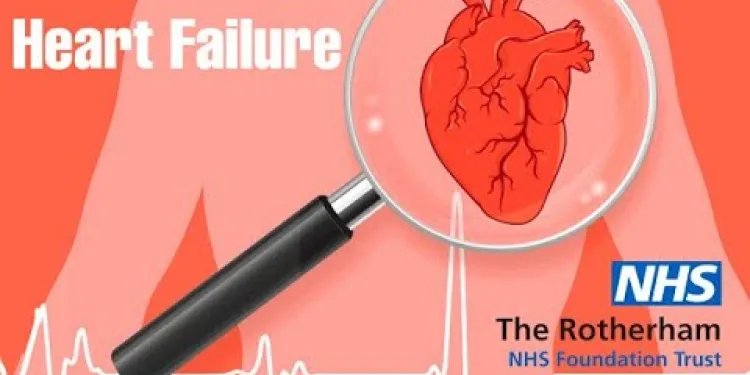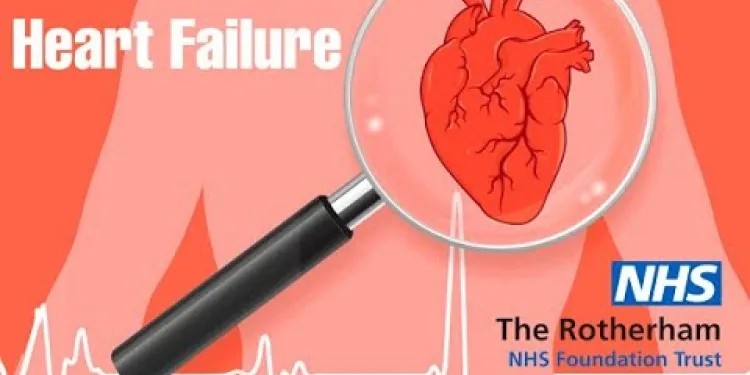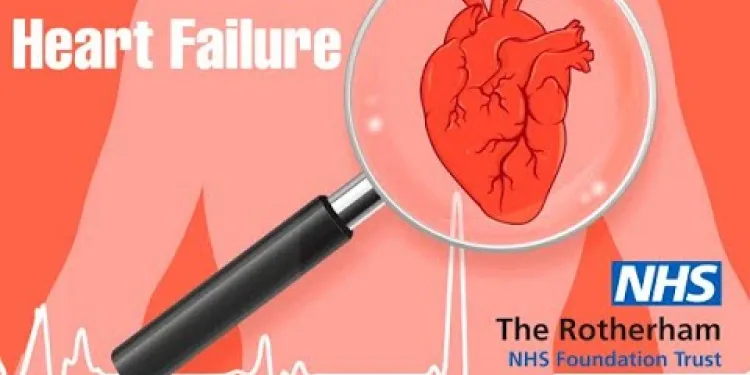
Find Help
More Items From Ergsy search
-

Heart Failure : What is heart failure?
Relevance: 100%
-

Heart Failure : Symptoms of heart failure
Relevance: 100%
-

What medications are commonly prescribed for heart failure?
Relevance: 98%
-

Heart Failure : Heart failure that cannot pump
Relevance: 98%
-

Heart Failure : The normal heart
Relevance: 95%
-

Heart failure introduction
Relevance: 93%
-

How is heart failure diagnosed?
Relevance: 90%
-

Are there different types of heart failure?
Relevance: 89%
-

Can heart failure be cured?
Relevance: 89%
-

Can heart failure be prevented?
Relevance: 88%
-

Heart Failure : When the heart becomes stiff?
Relevance: 88%
-

What causes heart failure?
Relevance: 87%
-

What is the prognosis for someone with heart failure?
Relevance: 85%
-

Is Baxdrostat used in treating heart failure?
Relevance: 84%
-

What is the role of diet in managing heart failure?
Relevance: 81%
-

How does exercise impact heart failure?
Relevance: 80%
-

Can heart failure affect other organs?
Relevance: 80%
-

Heart Failure : Treatment and monitoring of fluid retention
Relevance: 80%
-

What should I do if I experience symptoms of heart failure?
Relevance: 79%
-

What is heart failure?
Relevance: 70%
-

What are the common symptoms of heart failure?
Relevance: 62%
-

What lifestyle changes can help manage heart failure?
Relevance: 54%
-

How often should someone with heart failure see their doctor?
Relevance: 54%
-

Medicines of the heart
Relevance: 53%
-
Do over-the-counter medications help in preventing heart attacks and strokes?
Relevance: 52%
-

When should one start taking medication for heart attack prevention?
Relevance: 51%
-

Can lifestyle changes reduce the need for medication for heart disease prevention?
Relevance: 50%
-

Can diabetes medications also help reduce heart attack risk?
Relevance: 50%
-

Do all patients need medication to prevent heart attacks and strokes?
Relevance: 50%
-

Can patients with drug allergies still take heart disease medications?
Relevance: 49%
-

Is my abnormal heart rhythm dangerous?
Relevance: 49%
-

What are the long-term effects of a heart attack?
Relevance: 48%
-

How do beta-blockers contribute to heart attack prevention?
Relevance: 48%
-

How often should cholesterol levels be tested when taking heart disease medication?
Relevance: 46%
-

Heart stents
Relevance: 46%
-

Is my abnormal heart rhythm dangerous?
Relevance: 45%
-
What are the risk factors for a heart attack?
Relevance: 43%
-

Does coffee consumption have any long-term heart health effects?
Relevance: 42%
-

Heart Attack Stories | NHS
Relevance: 41%
-

Is it possible to prevent a heart attack?
Relevance: 41%
Introduction to Heart Failure Medications
Heart failure is a chronic condition where the heart is unable to pump blood efficiently. In the UK, managing heart failure often involves a combination of lifestyle changes and medications. This article outlines the common medications prescribed for heart failure to help patients better understand their treatment options.
Angiotensin-Converting Enzyme (ACE) Inhibitors
ACE inhibitors are commonly prescribed for heart failure as they help to relax blood vessels, making it easier for the heart to pump blood. They also help to reduce blood pressure and improve heart function. Examples of ACE inhibitors include ramipril, lisinopril, and enalapril. These medications are usually taken once or twice daily, with dosages adjusted based on the patient's response.
Angiotensin II Receptor Blockers (ARBs)
For patients who are unable to tolerate ACE inhibitors, ARBs are an alternative. They work in a similar manner by blocking the effects of angiotensin II, a substance that narrows blood vessels. Common ARBs prescribed in the UK include losartan, valsartan, and candesartan.
Beta-Blockers
Beta-blockers are another class of medications used in treating heart failure. They help to reduce the heart rate and the force of contraction, which decreases the heart's workload. In the UK, common beta-blockers include bisoprolol, carvedilol, and metoprolol. It is important for patients to start on a low dose, which is gradually increased under medical supervision.
Diuretics
Diuretics, often referred to as "water pills," help the body eliminate excess salt and water, reducing the symptoms of fluid buildup, such as swelling and shortness of breath. Common diuretics used in the UK include furosemide, bumetanide, and spironolactone. These are typically taken once or twice a day. Monitoring of kidney function and electrolytes is important while on these medications.
Aldosterone Antagonists
Aldosterone antagonists, such as spironolactone and eplerenone, are often used for patients with severe heart failure. They help to block the effects of aldosterone, a hormone that can cause the heart to retain salt and water, exacerbating heart failure symptoms.
Other Medications
Additional medications may include digoxin, which helps increase the strength of the heart's contractions, and hydralazine with nitrates, used particularly in patients of African or Caribbean descent. Treatment plans are highly individualised, and regular consultations with healthcare providers are essential to manage heart failure effectively.
Conclusion
Managing heart failure with medication is a crucial aspect of treatment in the UK. It involves a tailored approach that incorporates a variety of medications to improve heart function, reduce symptoms, and enhance quality of life. Patients should work closely with their healthcare team to ensure optimal treatment outcomes.
Introduction to Heart Failure Medicines
Heart failure is when the heart doesn't pump blood well. In the UK, treating heart failure means changing the way you live and taking medicines. This guide will explain common medicines for heart failure to help you understand your treatment better.
ACE Inhibitors
ACE inhibitors are medicines that help by relaxing blood vessels. This makes it easier for the heart to pump blood. They also lower blood pressure and help the heart work better. Some ACE inhibitors are ramipril, lisinopril, and enalapril. You usually take these medicines once or twice a day. The doctor can change how much you take based on how you feel.
ARBs
If you can't take ACE inhibitors, you might take ARBs. They work like ACE inhibitors by stopping a substance called angiotensin II, which makes blood vessels narrow. Common ARBs in the UK are losartan, valsartan, and candesartan.
Beta-Blockers
Beta-blockers are medicines used to treat heart failure. They help slow down the heart and lessen the heart's work. In the UK, some beta-blockers are bisoprolol, carvedilol, and metoprolol. Doctors start you on a small amount and slowly increase it.
Diuretics
Diuretics, or "water pills," help remove extra salt and water from the body. This helps reduce swelling and helps you breathe easier. In the UK, common diuretics are furosemide, bumetanide, and spironolactone. You usually take them once or twice a day. Doctors will check your kidneys and salt levels in your body when you take these.
Aldosterone Antagonists
Aldosterone antagonists, like spironolactone and eplerenone, are for people with bad heart failure. They stop a hormone called aldosterone, which makes the body keep salt and water. This helps improve heart failure symptoms.
Other Medicines
Other medicines include digoxin, which makes the heart pump stronger, and hydralazine with nitrates, especially for African or Caribbean patients. Everyone's treatment can be different. It's important to talk to your doctor a lot to handle heart failure well.
Conclusion
Taking medicines is important for managing heart failure in the UK. Using different medicines helps the heart work better, reduces symptoms, and makes life better. Work closely with your doctor to get the best treatment results.
Frequently Asked Questions
What is the purpose of medications prescribed for heart failure?
Medications for heart failure help manage symptoms, improve quality of life, and increase lifespan by improving heart function and reducing fluid buildup.
What is an ACE inhibitor and how does it help with heart failure?
An ACE inhibitor relaxes blood vessels and reduces strain on the heart by blocking the enzyme that produces angiotensin II, thereby lowering blood pressure and making it easier for the heart to pump blood.
Why are beta-blockers prescribed for heart failure?
Beta-blockers slow the heart rate and reduce blood pressure, decreasing the heart's workload and helping it to pump more efficiently.
What role do diuretics play in treating heart failure?
Diuretics, or 'water pills,' help remove excess fluid from the body, reducing swelling and making it easier for the heart to function.
What are common side effects of ACE inhibitors?
Common side effects of ACE inhibitors include a persistent dry cough, elevated blood potassium levels, low blood pressure, and kidney function changes.
Can you name some common ACE inhibitors?
Common ACE inhibitors include lisinopril, enalapril, ramipril, and captopril.
What are ARBs and how are they used in heart failure?
Angiotensin II Receptor Blockers (ARBs) reduce blood pressure by blocking the action of angiotensin II, offering an alternative for patients who experience side effects from ACE inhibitors.
What are examples of beta-blockers used for heart failure?
Examples of beta-blockers include carvedilol, metoprolol succinate, and bisoprolol.
Why might a doctor prescribe an ARB instead of an ACE inhibitor?
A doctor might prescribe an ARB if a patient experiences severe side effects, like a persistent cough or angioedema, from ACE inhibitors.
What are some common ARBs used in the treatment of heart failure?
Common ARBs include losartan, valsartan, and candesartan.
Why are aldosterone antagonists prescribed for heart failure?
Aldosterone antagonists help rid the body of excess salt and water, reduce blood pressure, and have protective effects on the heart by blocking aldosterone.
Can you give examples of aldosterone antagonists?
Examples of aldosterone antagonists include spironolactone and eplerenone.
What are the benefits of using an ARNI in heart failure treatment?
ARNIs, like sacubitril/valsartan, combine the benefits of an ARB with a neprilysin inhibitor to help the heart pump more effectively and reduce hospitalization risk.
What medications could be prescribed to address fluid retention?
Diuretics, such as furosemide and torsemide, are often prescribed to manage fluid retention.
Can digoxin be used in heart failure treatment?
Yes, digoxin can be used to strengthen heart contractions and manage symptoms in certain cases of heart failure.
What is the function of Ivabradine in heart failure management?
Ivabradine reduces heart rate to decrease the heart's workload in patients with heart failure who are in sinus rhythm.
Why is it important to monitor potassium levels in heart failure patients?
Monitoring potassium is crucial because heart failure medications like diuretics, ACE inhibitors, and ARBs can affect potassium levels, impacting heart function.
How does an ARNI work in the body?
An ARNI works by combining an ARB to block angiotensin II and a neprilysin inhibitor to prolong the effects of beneficial peptides, improving heart function.
Are there lifestyle changes that complement heart failure medications?
Yes, lifestyle changes such as a low-sodium diet, regular exercise, weight management, and smoking cessation are important alongside medication.
What should patients regularly discuss with their healthcare provider?
Patients should discuss medication effectiveness, side effects, lifestyle changes, symptom changes, and routine lab tests with their healthcare provider.
Why do people take medicine for heart problems?
Medicines for heart failure can help you feel better. They make your heart work better and help you live longer. They also stop extra fluid from building up in your body.
What is an ACE inhibitor and how does it help with heart failure?
ACE inhibitors are medicines that help your heart work better. They make it easier for the heart to pump blood.
These medicines are good for people with heart failure. Heart failure means the heart is not working as it should. ACE inhibitors help by relaxing blood vessels. This way, blood can flow more easily.
If you find this hard to understand, you can ask someone to explain it to you. Talking with a doctor or nurse can also help.
ACE inhibitors help your heart. They make the blood vessels open wider, so it's easier for your heart to pump blood. They stop a special enzyme from making something called angiotensin II, which normally makes blood vessels tighter. When blood vessels are wider, blood pressure goes down, and your heart doesn't have to work so hard.
To make reading easier, you can use a tool that reads the text out loud. You can also ask someone to read it with you, or use a dictionary to understand the words better.
Why do doctors give beta-blockers for heart problems?
Doctors give beta-blockers to help the heart. The heart pumps blood all around the body. Sometimes, the heart has problems and doesn't work well. This is called heart failure.
Beta-blockers help the heart beat more slowly and with less force. This can make it easier for the heart to do its job.
If you find reading hard, ask someone to read with you. You can also use audiobooks or special apps that read text out loud.
Beta-blockers are medicine. They help your heart beat slower and make your blood pressure lower. This means the heart doesn't have to work as hard, and it can pump blood better.
How do water pills help with heart problems?
Water pills are medicine that make you pee more. They help take extra water and salt out of your body. This is good for people with heart problems because it helps the heart work better.
Sometimes, hearts can get too tired because they have to push too much water and salt around the body. Water pills help the heart by making less work for it.
If you find this hard to read, you can ask someone to help you. Listening to the text read aloud can also help.
Diuretics are also called 'water pills.' They help the body get rid of extra fluid. This can make swelling go down and help the heart work better.
What Happens When You Take ACE Inhibitors?
ACE inhibitors are a type of medicine. Sometimes, they might cause side effects. This means you could have reactions that are not the ones you want.
Here are some things that might happen:
- You might start coughing.
- You could feel dizzy.
- Sometimes, your skin might get a rash.
- Your mouth might feel dry.
If you feel any of these things, tell a grown-up or your doctor. They can help you feel better.
Reading together with someone, like a friend or family member, can help you understand better. You can also use a dictionary to look up new words.
Some medicines called ACE inhibitors can make you feel different. They might give you a dry cough that won't go away, make you have more potassium in your blood, or make your blood pressure drop. They can also change how your kidneys work.
What are some common ACE inhibitors?
ACE inhibitors are medicines that help your heart. Here are some common ones:
- Lisinopril
- Enalapril
- Ramipril
To help you learn, you can:
- Use pictures or drawings of the medicines.
- Ask someone to say the names out loud for you.
Some common ACE inhibitor medicines are lisinopril, enalapril, ramipril, and captopril.
What are ARBs and how do they help with heart problems?
ARBs are medicines. They help people with heart problems.
ARBs make it easier for blood to move in your body. This helps your heart not work too hard.
If you have heart problems, a doctor might give you ARBs.
ARBs can help you feel better and keep your heart healthy.
To learn more, you can ask a family member or a doctor for help.
Angiotensin II Receptor Blockers, or ARBs, help lower blood pressure. They do this by stopping something called angiotensin II from working. This can be a good option for people who feel unwell using ACE inhibitors.
To make reading easier, you can try using tools like text-to-speech programs that read text out loud. Highlighting words as you read can also help.
What are some beta-blockers for heart problems?
Here are some names of beta-blocker medicines: carvedilol, metoprolol succinate, and bisoprolol.
Why would a doctor choose an ARB instead of an ACE inhibitor?
Doctors give medicine to help people get better. Sometimes, doctors have to choose which medicine is best.
There are two types of medicine: ARBs and ACE inhibitors. They both help with the same things, but they work in different ways.
A doctor might choose an ARB if a person cannot take an ACE inhibitor because it makes them cough or have other problems.
Both ARBs and ACE inhibitors help with blood pressure and heart problems, but ARBs have fewer side effects for some people.
If you have questions about your medicine, you can:
- Ask your doctor or nurse to explain it to you.
- Ask for pictures or simple words to help understand.
- Bring someone with you to the doctor to help remember the information.
If a person takes ACE inhibitors and gets bad side effects, like a cough that won’t go away or swelling, a doctor might give them a medicine called an ARB.
What ARBs do doctors use for heart problems?
ARBs are medicines that help the heart. Some ARBs that doctors often use are:
- Losartan
- Valsartan
- Candesartan
These medicines help make your heart work better. If you have trouble reading this, you can use tools like text-to-speech or ask someone to help you.
Some medicines that help with blood pressure are losartan, valsartan, and candesartan.
Why do doctors give aldosterone blockers for heart problems?
If your heart is not working well, doctors might give you medicine called aldosterone blockers. This helps your heart feel better by making it easier to pump blood around your body.
Aldosterone blockers are strong helpers. They stop a chemical in your body that can hurt your heart. This keeps your heart safe.
For people who find reading hard, tools like voice readers (that read texts out loud) and picture helpers (that show what words mean) can be useful.
Aldosterone antagonists help the body get rid of extra salt and water. They lower blood pressure and keep the heart healthy by blocking a chemical called aldosterone.
Can you tell me some aldosterone antagonists?
Aldosterone antagonists are medicines. They help with heart problems and high blood pressure. Here are some examples:
- Spironolactone
- Eplerenone
These medicines stop aldosterone, a chemical in your body, from working too much. This helps keep your heart healthy.
If you find reading hard, here are some tips:
- Ask someone to read aloud with you.
- Use apps that speak text out loud.
- Break down big words into smaller parts.
Here are some examples of medicines that help stop aldosterone.
These medicines are called spironolactone and eplerenone.
If these words are hard to read, ask someone for help or use tools like a text-to-speech app.
How can ARNI help when the heart is not working well?
ARNIs, like sacubitril/valsartan, are medicines that help your heart work better. They do this by mixing two things:
- A medicine that helps blood flow.
- A medicine that keeps your heart strong.
ARNIs can help you stay out of the hospital. They make it easier for your heart to pump blood around your body.
Here are some tips to help understand:
- Use simple words and short sentences.
- Try reading aloud to make it clearer.
- Use audio tools that read text for you.
What medicines can help with holding too much water?
Diuretics are medicines that help the body get rid of extra water. Some common ones are furosemide and torsemide. Doctors give these medicines to help people when they have too much water in their body.
Can we use digoxin to help with heart problems?
Digoxin is a medicine.
It can help people with heart problems.
If you or someone you know has trouble reading, here are some tips:
- Ask a friend or family member to read with you.
- Use an app to read the text aloud.
- Look for videos about the topic.
Yes, digoxin can help the heart beat stronger and make some heart problems better.
What does Ivabradine do for people with heart problems?
Ivabradine is a medicine. It helps people with heart problems. It slows down the heartbeat. This helps the heart work better. If you have trouble understanding, try: - Asking someone to explain it to you - Using pictures to help understand - Listening to the info instead of readingIvabradine helps your heart. It slows down your heart rate. This makes your heart work less hard. It is for people whose hearts do not pump well. It works if the heart's rhythm is normal.
Why do we need to check potassium in people with heart problems?
It's important to keep an eye on potassium in people with heart troubles. Potassium helps our hearts work right. If potassium is too high or too low, it can be dangerous for the heart.
Checking potassium levels often can keep people safe and healthy. Use tools or ask someone to help if needed, like family, friends, or health helpers.
It is important to keep track of potassium levels. Medicines for heart problems, like water pills and ACE inhibitors, can change potassium levels. This can affect how the heart works.
Using simple tools like charts, pictures, or apps can help make this easier.
How does an ARNI work in the body?
ARNI is a type of medicine. It helps your heart work better. This keeps you feeling well.
ARNI can make it easier for your heart to pump blood. It helps relax your blood vessels. This makes your blood go around your body better.
If you find reading hard, you can:
- Ask someone to read it with you.
- Use a text-to-speech tool.
- Break the text into smaller bits.
An ARNI is a medicine. It helps your heart work better.
ARNI does two things:
- It blocks something called angiotensin II with a medicine called an ARB. This helps your heart.
- It stops something else from breaking down good things in your body. This helps your heart, too.
If you find this hard to read, you can ask someone for help. You can also use tools that read text out loud.
What changes can help heart failure medicine work better?
Yes, making changes to how you live can help. Eating less salt, exercising often, keeping a healthy weight, and not smoking are important. These changes work well with taking medicine.
What should patients talk about often with their doctor?
It's important for patients to talk with their doctor often. Here are things you should talk about:
- How you are feeling. Tell your doctor if you feel sick, sad, or in pain.
- Any medicines you take. Tell your doctor about all the pills and vitamins you use.
- Any changes in your body or health. Tell your doctor if you notice anything new or different.
- Questions you have. If you don’t understand something, ask your doctor to explain it.
Here are some tools to help you:
- Bring a friend or family member. They can help listen and remember what the doctor says.
- Write down your questions before you go. This helps make sure you don’t forget to ask.
- Use a notebook or phone to take notes during the visit.
People should talk to their doctor about how well their medicine works, any side effects they might feel, changes in their daily life, changes in their symptoms, and any regular tests they need to have.
To help understand this information, you can:
- Ask your doctor to explain in simple words.
- Use pictures or diagrams when talking to your doctor.
- Write down questions before going to your appointment.
- Bring a friend or family member for support.
Useful Links
This website offers general information and is not a substitute for professional advice.
Always seek guidance from qualified professionals.
If you have any medical concerns or need urgent help, contact a healthcare professional or emergency services immediately.
Some of this content was generated with AI assistance. We’ve done our best to keep it accurate, helpful, and human-friendly.
- Ergsy carfully checks the information in the videos we provide here.
- Videos shown by Youtube after a video has completed, have NOT been reviewed by ERGSY.
- To view, click the arrow in centre of video.
- Most of the videos you find here will have subtitles and/or closed captions available.
- You may need to turn these on, and choose your preferred language.
- Go to the video you'd like to watch.
- If closed captions (CC) are available, settings will be visible on the bottom right of the video player.
- To turn on Captions, click settings .
- To turn off Captions, click settings again.
More Items From Ergsy search
-

Heart Failure : What is heart failure?
Relevance: 100%
-

Heart Failure : Symptoms of heart failure
Relevance: 100%
-

What medications are commonly prescribed for heart failure?
Relevance: 98%
-

Heart Failure : Heart failure that cannot pump
Relevance: 98%
-

Heart Failure : The normal heart
Relevance: 95%
-

Heart failure introduction
Relevance: 93%
-

How is heart failure diagnosed?
Relevance: 90%
-

Are there different types of heart failure?
Relevance: 89%
-

Can heart failure be cured?
Relevance: 89%
-

Can heart failure be prevented?
Relevance: 88%
-

Heart Failure : When the heart becomes stiff?
Relevance: 88%
-

What causes heart failure?
Relevance: 87%
-

What is the prognosis for someone with heart failure?
Relevance: 85%
-

Is Baxdrostat used in treating heart failure?
Relevance: 84%
-

What is the role of diet in managing heart failure?
Relevance: 81%
-

How does exercise impact heart failure?
Relevance: 80%
-

Can heart failure affect other organs?
Relevance: 80%
-

Heart Failure : Treatment and monitoring of fluid retention
Relevance: 80%
-

What should I do if I experience symptoms of heart failure?
Relevance: 79%
-

What is heart failure?
Relevance: 70%
-

What are the common symptoms of heart failure?
Relevance: 62%
-

What lifestyle changes can help manage heart failure?
Relevance: 54%
-

How often should someone with heart failure see their doctor?
Relevance: 54%
-

Medicines of the heart
Relevance: 53%
-
Do over-the-counter medications help in preventing heart attacks and strokes?
Relevance: 52%
-

When should one start taking medication for heart attack prevention?
Relevance: 51%
-

Can lifestyle changes reduce the need for medication for heart disease prevention?
Relevance: 50%
-

Can diabetes medications also help reduce heart attack risk?
Relevance: 50%
-

Do all patients need medication to prevent heart attacks and strokes?
Relevance: 50%
-

Can patients with drug allergies still take heart disease medications?
Relevance: 49%
-

Is my abnormal heart rhythm dangerous?
Relevance: 49%
-

What are the long-term effects of a heart attack?
Relevance: 48%
-

How do beta-blockers contribute to heart attack prevention?
Relevance: 48%
-

How often should cholesterol levels be tested when taking heart disease medication?
Relevance: 46%
-

Heart stents
Relevance: 46%
-

Is my abnormal heart rhythm dangerous?
Relevance: 45%
-
What are the risk factors for a heart attack?
Relevance: 43%
-

Does coffee consumption have any long-term heart health effects?
Relevance: 42%
-

Heart Attack Stories | NHS
Relevance: 41%
-

Is it possible to prevent a heart attack?
Relevance: 41%


